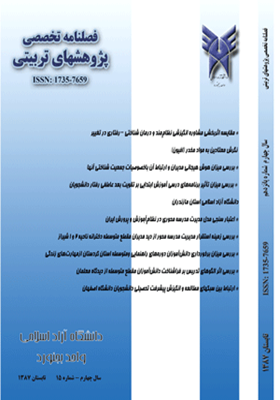بررسی میزان هوش هیجانی مدیران و ارتباط آن باخصوصیات جمعیت شناختی آنها
محورهای موضوعی : علوم تربیتیدکتر رمضان حسنزاده 1 , سید مرتضی ساداتی کیادهی 2
1 - دانشیار گروه روان شناسی دانشگاه آزاد اسلامی ساری
2 - کارشناس ارشد مدیریت آموزشی
کلید واژه: هوش هیجانی, جنسیت, تخصص مدیران, خصوصیات جمعیت شناختی,
چکیده مقاله :
هدف: هدف این پژوهش مطالعه اثر جنسیت، تخصص، و تحصیلات بر هوش هیجانی مدیران است. در این تحقیق میزان هوش هیجانی مدیران دورههای مختلف تحصیلی و ارتباط آن با خصوصیات جمعیت شناختی آنها بررسی شده است. روش: روش پژوهش توصیفی است. نمونه آماری این پژوهش تعداد 140 نفر از مدیران دورههای مختلف تحصیلی آموزش و پرورش ساری هستند که به شیوه نمونهگیری تصادفی طبقهای از بین جامعه آماری، بر اساس جدول تعیین حجم نمونه از روی حجم جامعه یا جدول کرجسی و مورگان، انتخاب شدند. از پرسشنامه جهت گردآوری دادهها استفاده شد. پرسشنامه شامل دو قسمت بود: مشخصات جمعیت شناختی مدیران و پرسشنامه هوش هیجانی. نتایج: نتایج آزمون فرضیهها نشان که: 1- هوش هیجانی مدیران دورههای مختلف تحصیلی، متفاوت نیست (5%P>، 774/0=م F). 2- هوش هیجانی مدیران با تجارب مدیریتی مختلف، متفاوت نیست (5%P>، 305/1=م F). 3- هوش هیجانی مدیران زن و مرد متفاوت است(5%P<، 851 /2=مt). 4- هوش هیجانی مدیران متخصص با مدیران غیرمتخصص متفاوت است(5%P<، 148 /3=مt). 5- هوش هیجانی مدیران با تحصیلات مختلف متفاوت نیست (5%P>، 185/0=م F). 6- هوش هیجانی مدیران با سنین مختلف متفاوت نیست (5%P>، 347/0=م F). بحث: بر اساس نتایج پژوهش حاضر میتوان گفت که هوش هیجانی از مؤلفههای ضروری مدیریت و رهبری است. آموزش، تخصص، و گذراندن دورههای آموزش هوش هیجانی در رشد و استفاده مناسب از آن در محیط کار مؤثر است.
OBJECTIVE :The present study investigates principals’ emotional intelligence in different educational stages and its relationship with their demographic characteristics. It was hypothesized that emotional control and emotional management would positively relate to personnel performance. METHOD: This research is done by descriptive research. In this research , the sample included 140 principals (69men and 71 women) from region one of Ministry of Education and Training in Sari that were selected by using stratified random sampling. Subjects provided information about their EI and their demographic characteristics by completing the Travis Bradbery and Jean Geaves' Emotional Intelligence questionnaire and researcher made questionnaire. RESULTS :1-There were no differences in Principal's emotional intelligence in different stages(F=0/774,P>./.5).2-There were no differences in Principal's emotional intelligence with different managerial experiences(F=1/305,P>./.5).3-There were differences in Principal's emotional intelligence with respect to their gender(men and women) (t=2/285,P<./.5).4-There were differences in Principal's emotional intelligence with respect to their specialty(t=3/148,P<./.5)..5-There were no differences in Principal's emotional intelligence with different education(F=0/185,P<./.5).6-There were no differences in Principal's emotional intelligence with different ages(F=0/347,P>./.5). CONCLUSION :Emotional intelligence is a significant predictor of successful school administration. Specifically, the results of the present study suggest that professional development programs would be wise to focus on promoting or developing EI. Consistent with previous research, women were found to score higher than men on EI

